A book a day keeps the doctor away. Isn’t that how the saying goes? Well maybe not, but everyone knows that reading’s definitely good for you. Although it may be a little harder to find a brick and mortar bookstore in your neighborhood these days, the consumer experience of reading is no longer limited to four walls, or hardcovers and paperbacks. Just as with so many other leisure activities, consumers can choose to stick to their screens if they’d like, and catching up on the latest Stephen King novel is no exception.
Ever since the E-book came along, reading on the go has gotten even easier. Whether you’re a daily commuter or traveling the friendly skies, seeing people with an e-reader in their hands instead of a book or a newspaper is no longer an uncommon sight. It’s not clear when exactly the first one was published however it is clear that e-books and e-readers have made their mark on the publishing world. But just how big of a mark?
That’s what we at SurveyMonkey wanted to find out. Whether people prefer to read on an e-reader like a Kindle or if they stick to the traditional paper and cloth experience, we wanted to know: Does it change how often folks read, or what they decide to read, or does it make any difference in the first place?
With SurveyMonkey Audience, a powerful product that helps your survey target a specific demographic, we asked over 300 American readers to share their views on reading today and on what the future might hold.
What are you curious about?
SurveyMonkey can help you get answers directly from your target market.
Here’s what we learned:
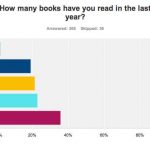
And so the face-off begins… In this corner we’ve got the print book vs. its battery-operated opponent, the E-book. Who will come out victorious? Well, let’s first take a look at who’s winning in the buying department:
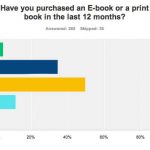
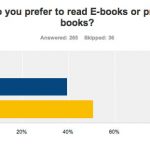
Not a huge surprise but it’s interesting to see that preferring to go with a print book when reading is the overwhelming second choice with nearly 40% throwing in their votes for the paper-cloth treatment. For those folks, we wanted to find out why they like to stick to the traditional way of reading. Many people wrote in their comments and had clear reasons for avoiding the screen like, “There’s something about curling up with a good book in one’s hands that can’t be beat” and “I spend enough time on computers at work, need a break” to “I like the feel of the pages.”
Nostalgia, comfort and convenience seem to be big reasons for keeping the physical book alive. Since the majority of people like their stories in both formats, however, we asked those who reported owning an E-book reader (58%), "What’s your #1 reason?"
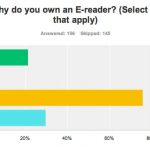
75% enjoy the convenience of having a device that can comfortably fit in your hand, weigh as little as 8 ounces, and yet carry the equivalent of 1,000 plus books wherever you go. The main reason that people avoid E-readers? Hint: It’s not because of the extra cost. Here’s where the print book can do a little happy dance–“I prefer to read print books” is the winning reason with nearly 40% saying so.
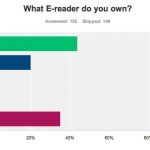
Only eleven percentage points are keeping the iPad (34%) from overtaking Amazon’s popular Kindle tablet devices (43%); publishers would be wise to continue keeping an eye on Apple’s “magical window” as the place for readers to check out the latest NYT bestsellers.
Finally, what does the future hold for reading? Does the print book stand a chance against the E-book? We asked, you spoke:
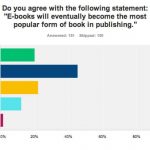
Seems like the smell and feel of paper, curling up on a rainy afternoon with a mug of tea and a thriller might be a thing of the past in the future with 45% of respondents agreeing.
Just as the music industry’s landscape has changed to meet consumers’ changing needs, the world of publishing has responded to the evolving times. What hasn’t changed though is peoples’ love of reading, and no matter what shape or size stories come in, we can be confident that they’ll continue to be enjoyed by many and passed on.



